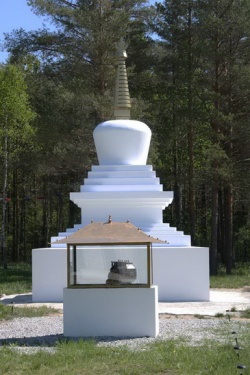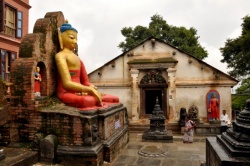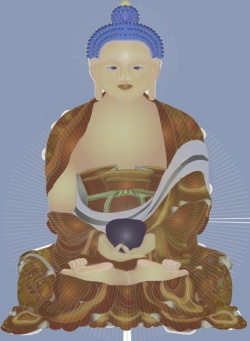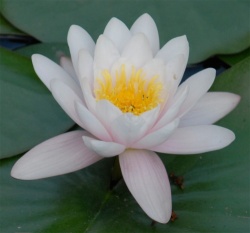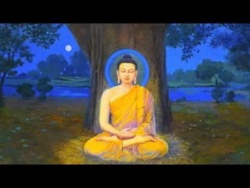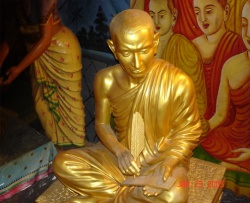Realization and Experience and Non-Dual Experience from Different Perspectives
(Written by PasserBy)
AEN, you have posted some very interesting and good quality articles in this blog. I enjoy reading them as well as those posts that you have written in TheTaoBums and your forum. Actually of all those recent articles you posted in the past 2 months, I like the talk given by Rob Burbea best but somehow I do not have the ‘on the spot urge’ to comment until this article by Rupert came. I do not know why but I will allow this urge to write itself. :)
While reading through these articles, there are several points that came to my mind, so I will just jot them down and expand them along the way.
1. On Experience and Realization
2. On Letting Go
3. On Ignorance, Disassociation and Liberation
4. On Non-Dual Experience, Realization and Anatta
1. On Experience and Realization
One of the direct and immediate response I get after reading the articles by Rob Burbea and Rupert is that they missed one very and most important point when talking about the Eternal Witness Experience -- The Realization. They focus too much on the experience but overlook the realization. Honestly I do not like to make this distinction as I see realization also as a form of experience. However in this particular case, it seems appropriate as it could better illustrate what I am trying to convey. It also relates to the few occasions where you described to me your space-like experiences of Awareness and asked whether they correspond to the phase one insight of Eternal Witness. While your experiences are there, I told you ‘not exactly’ even though you told me you clearly experienced a pure sense of presence.
So what is lacking? You do not lack the experience, you lack the realization. You may have the blissful sensation or feeling of vast and open spaciousness; you may experience a non-conceptual and objectless state; you may experience the mirror like clarity but all these experiences are not Realization. There is no ‘eureka’, no ‘aha’, no moment of immediate and intuitive illumination that you understood something undeniable and unshakable -- a conviction so powerful that no one, not even Buddha can sway you from this realization because the practitioner so clearly sees the truth of it. It is the direct and unshakable insight of ‘You’. This is the realization that a practitioner must have in order to realize the Zen satori. You will understand clearly why it is so difficult for those practitioners to forgo this ‘I AMness’ and accept the doctrine of anatta. Actually there is no forgoing of this ‘Witness’, it is rather a deepening of insight to include the non-dual, groundlessness and interconnectedness of our luminous nature. Like what Rob said, "keep the experience but refine the views".
Lastly this realization is not an end by itself, it is the beginning. If we are truthful and not over exaggerate and get carried away by this initial glimpse, we will realize that we do not gain liberation from this realization; contrary we suffer more after this realization. However it is a powerful condition that motivates a practitioner to embark on a spiritual journey in search of true freedom. :)
2. On Letting Go
Before proceeding further, I must thank you for the great effort of typing out the entire talk by Rob Burbea and making this transcript available. It is definitely worth reading again and again. There are 3 paragraphs about letting go in the transcript; I will add some comments to these paragraphs.
Now, one possibility is through developing the attentiveness, developing the mindfulness in a very sharp way, very focused awareness, very bright attentiveness, microscopic kind of fine awareness and really refining the mindfulness like that. And what happens is that the reality that’s revealed to us through that lens is of a very fastly, rapidly changing reality. Everything like pixels on the screen changing, like sand falling on the surface of a lake, just change, change, change, arising and passing, arising and passing, included in that consciousness. So the sense of consciousness is of rapidly arising moments, moment of consciousness, moment of consciousness, arises in relationship to something. And you find this very commonly in the commentaries to the Pali canon, it’s also a little bit in the Buddha said, but mostly in the commentaries. But again, can be very useful if one can develop that way just from the consistency of mindfulness. In that what it brings, seeing all these impermanence, there’s nothing to hold on to. Everything is just slipping through the fingers, like sand through the fingers, including consciousness, can’t be clung to. And so letting go happens with that. I say theoretically, because actually sometimes that mode of working doesn’t actually bring a letting go, but theoretically it brings a letting go and it certainly has that potential. So that’s another possibility again, with its fruits.
A third one we’ve touched more on in the course of the talks here, and it’s more practicing in the kind of more open out sense – and so awareness kind of opens out into the whole field of experience and phenomena. And this opening out of the practice lends itself to having a sense of awareness as something very spacious. Especially when we talk about silence a little bit. Awareness begins to seem incredibly spacious, vast, unimaginably vast. Now this can be arrived at actually through letting go. So the more we let go in practice, the likelihood of the sense of awareness opening up in this very beautiful way. Very vast awareness, dependent on letting go.
And how do we let go? We could either just focus on letting go, we could focus on the impermanence and then we let go, or we could focus on the Anatta – not me, not mine. That’s the three classic ways of letting go. That sense of vast awareness might also be discovered or arrived at just by kind of practicing in a kind of way that relaxes the attention. So usually we attend to this object and that object, and another object, and another object. But actually relaxing that propensity, and being more interested in the space that opens up, rather than the objects or things in the space. And we say you can rest then in Awareness, instead of going out and doing things with objects, one just rests in that space of Awareness that begins to opens up. This is something one can do with the eyes open, or with the eyes close, actually completely irrelevant. Practice it with the eyes open, practice it with the eyes closed.
Buddhism aside, I would like to emphasize that we should never underestimate the art of ‘letting go’, it will soon prove to be our most challenging endeavor in life. To ‘let go’ often requires the deep wisdom from undergoing the ups and downs of life and even with a life-long practice, we may still not be able to understand the breadth and depth of 'letting go'.
My experience is that before the arising insight of anatta and emptiness nature of all phenomena, ‘letting go’ is somehow related to the degree of suffering. Very often, many of us need to go through a process of intense suffering before which we can really ‘let go’. It seems to be a pre-requisite condition in order to give rise to that ‘willingness’ of ‘letting go’. :)
The mind does not know how to liberate itself.
By going beyond its own limits it experiences unwinding.
From deep confusion it drops knowing.
From intense suffering comes releasing.
From complete exhaustion comes resting.
All these go in cycle perpetually repeating,
Till one realizes everything is indeed already liberated,
As spontaneous happening from before beginning.
~ Thusness
Rob links the practice of seeing impermanence and anatta in transient phenomena to dis-identification and disassociation. I disagree; I will give my views and comments in the next section.
3. On Ignorance, Disassociation and Liberation
Most of the articles you posted recently are about non-dual experience and vast open spaciousness of awareness. My advice is not to over-skew yourself into just the non-dual aspect of experience and neglect 'ignorance', having direct insight of ignorance is as important. For non-dualists, Presence pervades everywhere but this is equally true for Ignorance. It pervades in all aspects of our experiences and that includes deep absorptive state or non-dual, non-conceptual, objectless state. So deeply feel the amazing blinding power of ‘ignorance’, how latently deep, how it shapes and distorts experiential reality. I cannot find any magical spell more hypnotic than our inherent and dualistic view.
If we were to practice observing impermanence of phenomena while the ‘blinding spell’ is still strong, the purpose of the practice appears to swerve towards dispassion, dis-identification and disassociation. In fact it is quite fine even if it is understood that way but many can’t stop at dispassion and dis-identification and rest in perfect contentment in groundlessness. Somehow they will ‘conjure’ out a permanent unchanging state to rest upon. ‘Not self, not mine’ sounds as if there is something ‘Mine or Self’. I would prefer practitioners to treat ‘anatta’ as ‘there is absolutely nothing that can be said to be mine or self’; even then this realization that ‘there is absolutely nothing that can be said to be mine or self’ should not be misunderstood as the experiential insight of anatta (see On Anatta (No-Self), Emptiness, Maha and Ordinariness, and Spontaneous Perfection). I have placed stronger emphasis on this aspect as in Buddhism, nothing is more important than to arise the insight of anatta and dependent origination because it is wisdom (prajna wisdom in particular) that liberates (since the cause of suffering is ignorance). Do not take it too lightly. :)
Nevertheless this progression seems quite inevitable because the mind is ruled by ignorance (dualistic and inherent tendency). More amazingly, the mind can fabricate such a state and think that it is the resting place, nirvana. This is the danger of all dangers because like what Rob said, it is so beautiful and fits so nicely into the ideal model of an inherent and dualistic mind. When a practitioner gets into it, it is difficult to let go.
However if insight of anatta arises and we revisit the practice of observing phenomena, we will realize that liberation does not require ‘such permanent state or self/Self’. We just have to dissolve ignorance and impermanence turns self liberating. So what we discard turns out to be our ultimate goal and the reason why we can’t find liberation becomes obvious -- because we are running away from liberation; likewise, the reason why we suffer is because we are actively seeking suffering. This is exactly what I meant by the following 2 paragraphs in your forum:
"...it seems that lots of effort need to be put in -- which is really not the case. The entire practice turns out to an undoing process. It is a process of gradually understanding the workings of our nature that is from beginning liberated but clouded by this sense of ‘self’ that is always trying to preserve, protect and ever attached. The entire sense of self is a ‘doing’. Whatever we do, positive or negative, is still doing. Ultimately there is not-even a letting go or let be, as there is already continuous dissolving and arising and this ever dissolving and arising turns out to be self-liberating. Without this ‘self’ or ‘Self’, there is no ‘doing’, there is only spontaneous arising. "
~ Thusness (source: Non-dual and karmic patterns)
"...When one is unable to see the truth of our nature, all letting go is nothing more than another from of holding in disguise. Therefore without the 'insight', there is no releasing.... it is a gradual process of deeper seeing. when it is seen, the letting go is natural. You cannot force urself into giving up the self... purification to me is always these insights... non-dual and emptiness nature...."
~ Thusness
Hence disassociation immediately puts us into a position of dualism and that is why I disagree with Rob. If insight of anatta arises, there is no center, no base, no agent; there is only phenomena dependently originating and practitioners must from this very experience of vivid arising and dissolving instantly arise another important insight -- that this vivid shimmering that dependently originates is naturally pure and self-liberating.
Lastly, I am not suggesting that there is a definite order of precedence for realizing the profound meaning of the dharma seals; it all depends on the conditions and capacity of each practitioner. But given the choice, start from penetrating the true meaning of anatta first, we will have very different understanding of impermanence, suffering and nirvana once we mature our insight of anatta. :)
4. On Non-Dual Experience, Realization and Anatta
I have just casually gone through some of your forum discussions. Very enlightening discussions and well presentation of my 7-phases-of-insights but try not to over-emphasize it as a model; it should not be taken as a definite model of enlightenment nor should you use it as a framework to validate others' experiences and insights. Simply take it as a guide along your spiritual journey.
You are right to differentiate non-dual experience from non-dual realization and non-dual realization from the insight of anatta. We have discussed this umpteem times. Non-dual experience in the context we are using refers to the experience of no-subject-object division. The experience is much like putting two candle flames together where the boundary between the flames becomes indistinguishable. It is not a realization but simply a stage, an experience of unity between the observer and the observed where the conceptual layer that divides is temporarily suspended in a meditative state. This you have experienced.
Non-dual realization on the other hand is a deep understanding that comes from seeing through the illusionary nature of subject-object division. It is a natural non-dual state that resulted from an insight that arises after rigorous investigation, challenge and a prolonged period of practice that is specially focused on ‘No-Self’. Somehow focusing on “No-Self” will spark a sense of sacredness towards the transient and fleeting phenomena. The sense of sacredness that is once the monopoly of the Absolute is now also found in the Relative. The term ‘No-Self’ like Zen-Koan may appear cryptic, senseless or illogical but when realized, it is actually obviously clear, direct and simple. The realization is accompanied with the experience that everything is being dissolved into either:
1. An ultimate Subject or
2. As mere ‘flow of phenomenality’
In whatever the case, both spells the end of separateness; experientially there is no sense of two-ness and the experience of unity can be quite overwhelming initially but eventually it will lose its grandeur and things turn quite ordinary. Nevertheless, regardless of whether the sense of Oneness is derived from the experience of ‘All as Self’ or ‘as simply just manifestation’, it is the beginning insight of “No-Self”. The former is known as One-Mind and the later, No-Mind.
In Case 1 it is usual that practitioners will continue to personify, reify and extrapolate a metaphysical essence in a very subtle way, almost unknowingly. This is because despite the non-dual realization, understanding is still orientated from a view that is based on subject-object dichotomy. As such it is hard to detect this tendency and practitioners continue their journey of building their understanding of ‘No-Self based on Self’.
For Case 2 practitioners, they are in a better position to appreciate the doctrine of anatta. When insight of Anatta arises, all experiences become implicitly non-dual. But the insight is not simply about seeing through separateness; it is about the thorough ending of reification so that there is an instant recognition that the ‘agent’ is extra, in actual experience it does not exist. It is an immediate realization that experiential reality has always been so and the existence of a center, a base, a ground, a source has always been assumed.
To mature this realization, even direct experience of the absence of an agent will prove insufficient; there must also be a total new paradigm shift in terms of view; we must free ourselves from being bonded to the idea, the need, the urge and the tendency of analyzing, seeing and understanding our moment to moment of experiential reality from a source, an essence, a center, a location, an agent or a controller and rest entirely on anatta and Dependent Origination.
Therefore this phase of insight is not about singing eloquently the non-dual nature of an Ultimate Reality; contrary it is deeming this Ultimate Reality as irrelevant. Ultimate Reality appears relevant only to a mind that is bond to seeing things inherently, once this tendency dissolves, the idea of a source will be seen as flawed and erroneous. Therefore to fully experience the breadth and depth of no-self, practitioners must be prepared and willing to give up the entire subject-object framework and be open to eliminate the entire idea of a ‘source’. Rob expressed very skillfully this point in his talk:
One time the Buddha went to a group of monks and he basically told them not to see Awareness as The Source of all things. So this sense of there being a vast awareness and everything just appears out of that and disappears back into it, beautiful as that is, he told them that’s actually not a skillful way of viewing reality. And that is a very interesting sutta, because it’s one of the only suttas where at the end it doesn’t say the monks rejoiced in his words.
This group of monks didn’t want to hear that. They were quite happy with that level of insight, lovely as it was, and it said the monks did not rejoice in the Buddha’s words. (laughter) And similarly, one runs into this as a teacher, I have to say. This level is so attractive, it has so much of the flavor of something ultimate, that often times people are unbudgeable there.
What then is the view that Buddhism is talking about without resorting to a ‘source’? I think the post by Vajrahridaya in the thread ‘What makes Buddhism different’ of your forum succinctly and concisely expressed the view, it is well written. That said, do remember to infinitely regress back into this vivid present moment of manifestation – as this arising thought, as this passing scent – Emptiness is Form. :)
